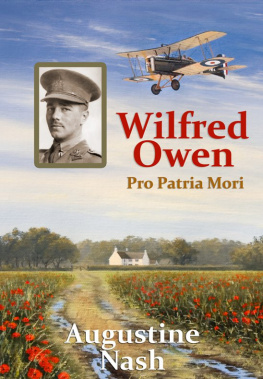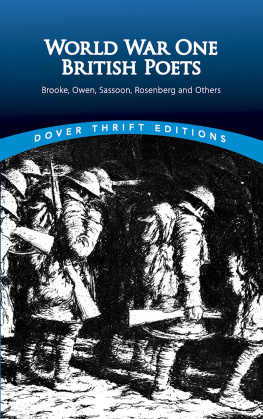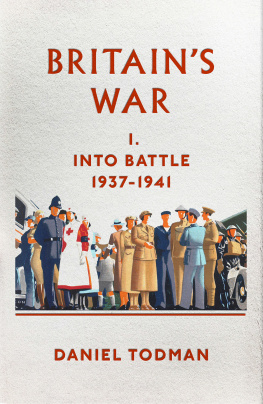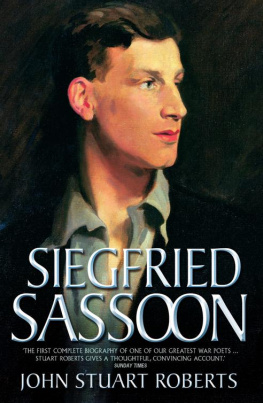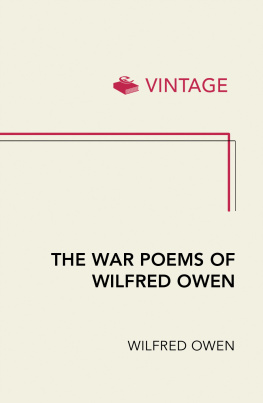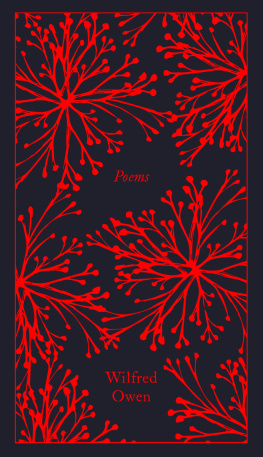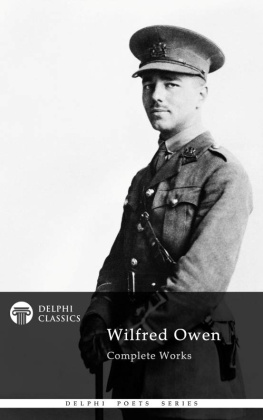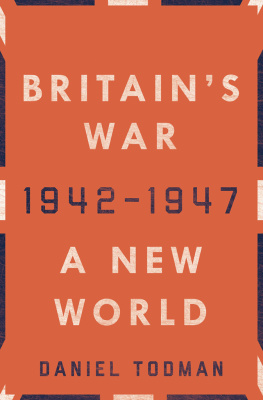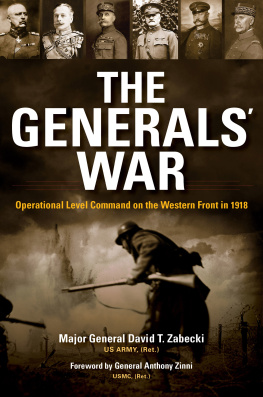THE GREAT WAR
MYTH AND MEMORY
The Great War
Myth and Memory
Dan Todman
www.bloomsbury.com/thegreatwar 

Contents
Between
I am grateful to the BBC for permission to quote from material in its Written Archives Centre; to the Archbishop of Canterbury and the Trustees of the Lambeth Palace Library for permission to quote from the Ramsey Papers; to the Trustees of the Liddell Hart Centre for Military Archives for permission to quote from the Liddell Hart Papers; and to the Trustees of the National Library of Scotland for permission to quote from material held in the Haig Papers. Every effort has been made to locate copyright holders (particularly for material held in the Imperial War Museum and the Brotherton Library, Leeds), but I apologise to anyone whose copyright may inadvertently have been infringed.
The author and publishers are grateful to the following for permission to reproduce illustrations: the Imperial War Museum (plates 14, 6, 7, 9); the National Library of Scotland, plate 8; and the Owen Collection, Oxford English Faculty Library, University of Oxford, plate 5.
The guns fell silent on the Western Front at 11 a.m. on 11 November 1918. Eighty years after the Armistice, in the autumn of 1998, Britons turned their thoughts back to the First World War. It was a war that few then alive could remember and that even fewer had experienced as adults. Even so, newspapers filled their columns with stories of surviving veterans, accounts of the descendants of dead soldiers travelling back to the battlefields and cemeteries, and reviews of the numerous television programmes, books, plays and exhibitions which had been commissioned to mark the wars anniversary.
That the war continues to play a part in British culture is not surprising. It was a unique event in British history: the mass mobilisation of the population to fight a land war against the main strength of a great power opponent on the European mainland. The effort required affected the life of every Briton at the time, most traumatically through the death of three quarters of a million men. It deserved the epithet Great bestowed upon it by contemporaries. Even if few in 1998 had experienced it at first hand, many had grown up with its echoes resounding in their ears.
Britons in 1998 also shared a clear set of ideas about what the First World War meant and what it had been like, ideas which enabled commentators across the political and social spectrum to discuss the war in shared terms. The war was depicted as a tragedy and a disaster. In 1914 the nations of Europe had stumbled into a struggle that no one really wanted, sparked off by a murder in the Balkans that had little relevance to Britain. In response to their countrys call to arms, a generation of eager young Britons joined up to fight a war they didnt understand. They marched off to France and Flanders, leaving behind an idyllic Edwardian age that would never be recaptured. Once there, they fell under the command of a group of incompetent commanders, asinine aristocrats obsessed with cavalry. Safely ensconced miles behind the lines, these generals were unable to grasp
This interpretation continues to dominate how Britons think about the First World War in the first decade of the twenty-first century. Almost certainly it shapes how you imagine the war as you read this. This book is about how this version of the war came about and why it remains so powerful.
These beliefs did not become widely shared because they offered the only accurate interpretation of wartime events. In every respect, the war was much more complicated than they suggest. In recent years, historians have argued persuasively against almost every popular clich of the First World War. It has been pointed out that, although the losses were devastating, their greatest impact was socially and geographically limited. The many emotions other than horror experienced by soldiers in and out of the front line, including comradeship, boredom and even enjoyment, have been recognized. The war is not now seen as a fight about nothing, but as a war of ideals, a struggle between aggressive militarism and more or less liberal democracy. It has been acknowledged that British generals were often capable men facing difficult challenges, and that it was under their command that the British army played a major part in the defeat of the Germans in 1918: a great forgotten victory.
None of this has made the slightest difference to what most people actually believe about the First World War. Some readers may have changed their minds about the abilities of generals, or the reasons the war was fought, but the same basic understanding of the war as tragedy and disaster still pervades British culture. In part this is a problem of imaginative inertia: the great human difficulty in jumping from one vision of the world to another. But it is also because of the functions that our shared beliefs about the war fulfil. They have achieved the status of a modern mythology and as such are knitted into the social fabric.
For most people history is not a perfectly remembered set of dates, The history you can remember is, if not the only sort that matters, definitely the sort that is held most widely.
In trying to describe this history you can remember, this book uses the word myth. Here, a myth is a belief about the past held by an individual but common to a social group. The size of that social group can vary from the nation as a whole, down through towns or districts, to the level of single families. Myths held at different levels of society interact. At the lowest level, although they incorporate national and local myths, they focus on the experiences of family members. One facet of Britons continuing emotional involvement with the war has been a fascination with what their Dad, Grandad or Great Grandad did in it.
Myths simplify, reducing the complex events of the past to an easily understood set of symbols. All historical explanations inevitably simplify the complex nature of the past. Myths in themselves are not a bad thing; they are a necessary part of human society and they can function for good or ill.
Popular myths about the First World War have not remained constant over time. The roots of our current mythology lie in events and opinions held during it, but what we have now was not the only possible version. In 1918, some Britons felt that the war had been a tragedy. For many of them, on an individual emotional level, it was a disaster. Yet even those who had lost loved ones to the war constructed a host of other meanings around it. The war could mean survival, victory (personal and national), disappointment, comradeship, unity, sorrow, shared purpose, betrayal, sacrifice, redefined status, and enjoyment; sometimes all at the same time. It was by no means certain that it was from these that our modern version of the war would emerge. How did we get from there to here? Why was it that certain myths grew stronger and more dominant whilst others disappeared from view?
Studying how people thought in the past is difficult. It is not possible to conduct a retrospective survey of opinion even amongst those still alive, since their recollections of how they thought even a short while ago will have altered over time. What we do have, of course, is the vast quantity of books, plays, television and radio programmes, memorials, advertisements, films and ceremonial activities which grew up around the subject of the war. By exploring how these were produced and received, we can attempt to uncover the myths which underpinned them.
Next page

